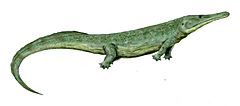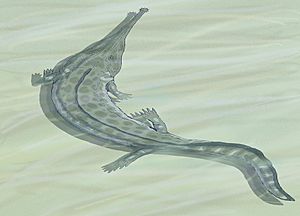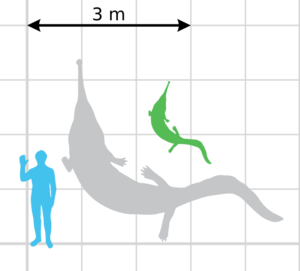Prionosuchus facts for kids
Quick facts for kids PrionosuchusTemporal range: Permian
|
|
|---|---|
 |
|
| Prionosuchus plummeri | |
| Scientific classification | |
| Kingdom: | |
| Phylum: | |
| Superclass: | |
| Class: | |
| Order: | |
| Family: |
†Archegosauridae
|
| Genus: |
†Prionosuchus
L. I. Price, 1948
|
| Species | |
|
|
Prionosuchus was a very large amphibian that lived about 270 million years ago. This was during the Middle Permian period. Its fossils have been found in Brazil. This ancient creature was one of the biggest amphibians ever discovered!
Contents
What did Prionosuchus look like?
The first pieces of this animal were found in the Parnaiba Basin in northeast Brazil. Scientists believe Prionosuchus could grow up to 9 meters (30 feet) long. This makes it the largest amphibian ever found!
Prionosuchus had a long, thin snout. It was filled with many sharp teeth. It also had a long body and short legs. Its tail was perfect for swimming in the water. It probably looked a lot like a modern gharial, which is a type of crocodile.
Is Prionosuchus a real genus?
In 1991, some scientists thought Prionosuchus might be the same as another animal called Platyoposaurus. Platyoposaurus was found in Russia. However, Platyoposaurus was much smaller, only about 2.5 meters (8.2 feet) long. Also, the rocks where they were found showed they lived at different times. Most paleontologists today agree that Prionosuchus is its own unique type of animal.
Where did Prionosuchus live?
Prionosuchus lived in a warm, wet, tropical place. We know this because of the petrified forest found where its fossil was. This area, called the Pedra do Fogo formation, had many ancient trees. The rocks there are made of siltstones, shales, and limestones. This tells us the area was once a mix of lagoons and rivers.
Other animals found in the same rocks include different kinds of fish. There were primitive sharks, palaeoniscids, and lungfish. Other amphibians also shared this ancient home.
How did Prionosuchus live?
Because it looked like a crocodile, Prionosuchus probably lived like one too. It was likely an ambush predator in the water. This means it would hide and then suddenly attack its prey. It probably ate fish and other aquatic animals.
Prionosuchus belonged to a group called the Archegosaurs. These were a type of temnospondyl amphibian. They filled the same role as crocodiles and alligators do today. A smaller European animal called Archegosaurus is a good example of this group. The Archegosaurs died out at the end of the Permian period. Later, in the Triassic period, other amphibians and reptiles like the phytosaurs took over their role.
See also
 In Spanish: Prionosuchus para niños
In Spanish: Prionosuchus para niños
 | William Lucy |
 | Charles Hayes |
 | Cleveland Robinson |



